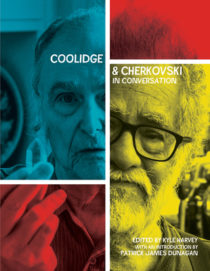 Clark Coolidge & Neeli Cherkovski
Clark Coolidge & Neeli Cherkovski
Edited by Kyle Harvey
Lithic Press ($17)
by Matt Hill
To find a form that accommodates the mess, that is the task of the artist now.
—Samuel Beckett
This fascinating book offers a transcribed conversational collage between the poets Clark Coolidge and Neeli Cherkovski. Swapping their stories and memories, ranging across topics and poetic encounters from the 1960s to the present, “these poets recall: A lifetime’s worth of friendships, amazements, assessments, and straight up happy-to-be-there goodtimes buoyed by powers of poetry,” as Patrick James Dunagan puts it in the Introduction. The book comes rounded out with two appendices, providing some personal history and thoughts on poetics and the trajectories of the poets over the years.
The tenor of the exchanges serves as our baseline while we listen in on Coolidge and Cherkovski, absorbing their anecdotes and imagining the gesticulations of their hands cutting through the air. Readers will get a palpable sense of being seated there in Coolidge’s living room while the conversation flows along. Replete with the lore of two very disparate poets’ unique encounters throughout their lifetimes, this recorded afternoon “serves as a valuable archival document for younger generations of poets,” as Kyle Harvey says in the Preface.
“Restlessness makes me a poet,” says Cherkovski. “My ear is attuned to many influences. Federico Garcia Lorca, is, perhaps, the poet I think of more often than others when I sit down to write. . . . I’d be remiss if I did not mention Rainer Maria Rilke. Whenever I travel his work goes with me.” Cherkovski also talks some about his teaching at The New College in SF: “I ran an MFA program . . . They [the students] were in it for success. I remember telling them, I said, ‘Boy, you’ve come to the wrong place with me, because I don’t really like that altar.’” The talk veers around to minutia involving Stein, Ginsberg, Olson, Creeley, and Bukowski; Coolidge discusses his friendship with the artist Philip Guston, while Cherkovski mentions his North Beach days with Bob Kaufman, Jack Hirschman, and Philip Lamantia, as well as his time prior to that in LA. Coolidge relates a story of how Philip Whalen upstaged Olson and Duncan at the Vancouver Poetry Festival in 1963, a particularly extraordinary anecdote.
Regarding poets and their influence upon each other, Coolidge says, “Sometimes you could see a little phrase or something that you might like—I mean, we all stole from each other. Like hell, I mean, who was it? Tom Clark said, ‘Nobody owns the words.’ And of course, we don’t.” We hear about everything from Pound, Eliot, and Williams, to the lack of a poetry “scene” in LA, to movie guys like Dennis Hopper and Dean Stockwell, to staying away from the academic life. Coolidge says “I just couldn’t imagine spending all that time, really, explicating. . . . your mind is being spent in that other room. That other space, which is all about explication, not creation.”
The differences that come up between the two poets are equally fascinating. Cherkovski confesses, “I’m a narrative, linear poet—I mean, [Charles] Bukowski was my teacher. You know, it took me years to get out from under that, to develop my own thing. Coolidge, meanwhile, casts himself as a “process guy”, careening around in his recallings of the jazz scene in NYC, or what was and was not being read or talked about at Brown University in the ’50s. These exchanges permit both poets a free-flow of stories as they trigger and bounce off each other.
Perhaps what becomes most manifest listening to these seasoned poets is that they have no need to self-mythologize their writing, or even to ego-cize their life trajectories through the decades. Both are still publicly reading fresh work, and in Cherkovski’s case, posting his poems on social media. As such, and as we endure these fraught times, when temptations lurk to let the creative fires burn out, these two poets shine like beacons across the dark waters, inspiring those of us coming up to believe in our own poetic process, and to “blast the rules” so that we may move forward into the unknown.
